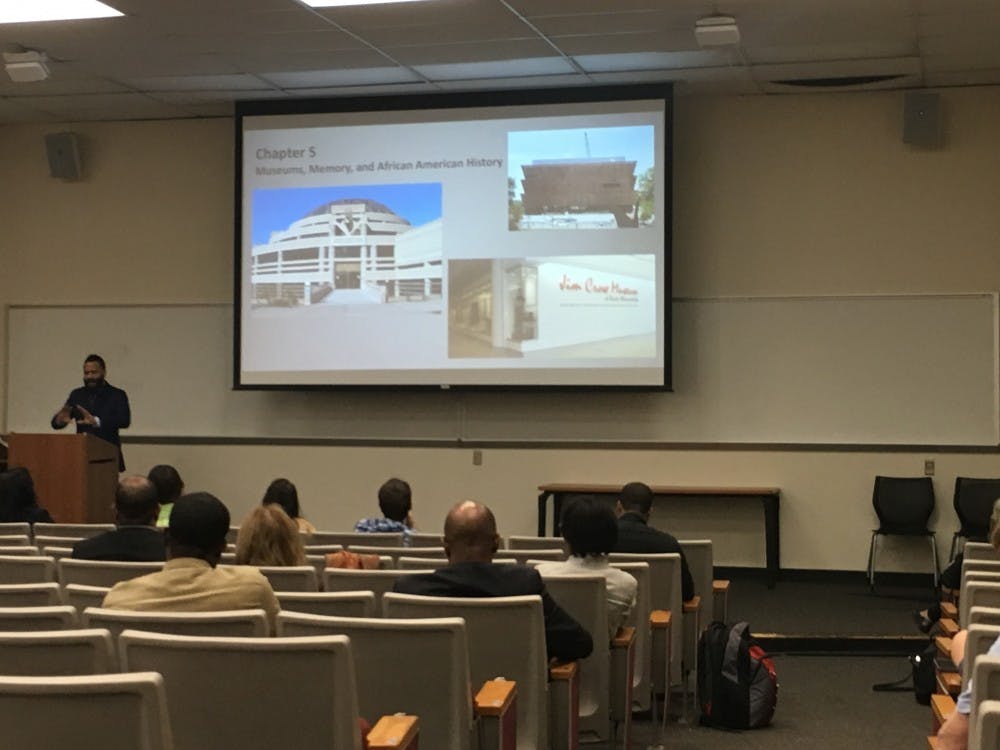With two months passed since Black History Month and race relations in the U.S. on sometimes unsteady ground, the question of African American history and how it is discussed has become an important issue.
The USC African American Studies Graduate Society hosted Pero Dagbovie, a history professor at Michigan State University and prevalent black studies scholar, to discuss his recent book, "What is African American History?" and the importance of modern black history in the U.S.
Dagbovie outlined each of the six chapters of his book, which focus on various aspects of how black history has developed in recent decades. The first chapter discusses President Barack Obama and how his speeches address black history depending on his audience. Dagbovie said that Obama expresses himself differently, sometimes very differently, when he is speaking to an African American audience as opposed to when he speaks to predominantly white audiences.
The second chapter focuses on Black History Month, which several public figures have denounced as unnecessary. Dagbovie particularly mentioned Shukree Hassan Tilghman's film, "More than a Month,"in which Tilghman is depicted wearing a sign that reads, "End Black History Month." The professor said that many opponents of the celebratory month believe that it has become overly commercialized.
"This is when all the different businesses and corporations come out and say how much they support Black History Month," Dagbovie said, "and if we look at their policies, we can probably tell that they might not support black people."
The third and fourth chapters focus on how Hollywood films and popular comedians ignore or confront aspects of black history. Dagbovie contended that many viewers of popular movies, such as "The Help" and "12 Years a Slave," interpret them as being accurate historical records of nonfiction events. In reality, he argued, most films don't convey the depth to which racism has been part of American culture, but instead try to condense it into unlikeable characters.
When it comes to comedy, Dagbovie acknowledged that it can facilitate conversations that should be happening, but there might be some issues that are too sensitive to treat lightly.
"They've all parodied dimensions of black history, and the results can oftentimes be controversial," he said. "Humor and comedy have been central characteristics of black culture for more than a century. It's been a survival strategy."
In the fifth chapter, Dagbovie discusses the way three museums — the Charles H. Wright Museum of African American History, the Jim Crow Museum of Racist Memorabilia and the National Museum of African American History and Culture — portray black history. He is concerned that some exhibits will focus too much on the oppression of African Americans, whereas others could neglect the negative side and over-glorify their triumphs.
The sixth chapter focuses on the ways in which the government has been revisiting and attempting to right past mistakes, starting with former President Bill Clinton's apology in 1997 for the Tuskegee Study of Untreated Syphilis, an extended medical study conducted on black men.
The conclusion of Dagbovie's book is dedicated to the future of black history studies. He believes that modern programs represent "the manifestation of black power" that was present in universities in the 1960s and 1970s. He thinks that programs would benefit from a return of the social responsibility concepts that encourage young black studies scholars to work to benefit the African American community.
"The majority of black studies programs today no longer have service component requirements in their programs, whereas back in the heyday that people like to romanticize sometimes, social activism — social responsibility — was part of the core of the study," Dagbovie said.
The African American Studies Graduate Society hopes to incorporate social activism into their academic pursuits. Alexandria Russell, a graduate history student and president of AASGS, thinks that Dagbovie is an example she and her fellow scholars can work toward.
"This is what I call scholarly excellence," she said. "It's always good to ask people who have been there what they think, and certainly someone with the kind of context that he's bringing was an asset."
AASGS is a relatively new student organization on campus. They began meeting as a society, with USC faculty and visiting professors and scholars, last school year. Russell thinks that the black studies programs will continue to grow, especially if the university focuses on recruiting faculty and students who are interested in the field.
"We're really committed to creating an atmosphere where graduate students and faculty can get together and understand the broad field of African American studies," Russell said. "I think the future is to continue to build upon the work of such excellent scholars in black history and to teach classes that are specialized and that focus on the contributions of African Americans over time."

